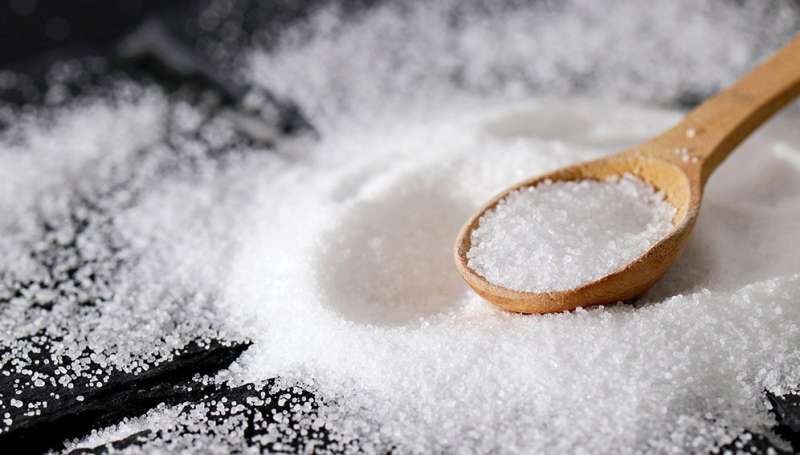This article has been reviewed according to Science X's editorial process and policies. Editors have highlighted the following attributes while ensuring the content's credibility:
fact-checked
peer-reviewed publication
proofread
Table salt needs extra iodine, finds Bangladesh study

A Bangladesh study published in Food Chemistry Advances shows wide variation in iodine levels among packaged salt brands sold locally.
As table salt loses iodine content during storage, extra amounts of the element that is vital for the prevention of iodine deficiency diseases should be added during the manufacture of packaged salt, the study suggests.
The body needs a certain amount of iodine for the healthy functioning of the thyroid gland and deficiency can lead to problems such as goiter, a swelling of the gland in your neck that helps with hormone regulation.
According to UNICEF, iodine deficiency is particularly damaging during pregnancy and early childhood and can cause miscarriages, stillbirth, mental retardation and learning disability. Iodine deficiency is the most common preventable cause of mental retardation.
Globally, 89% of people consume salt with some amount of iodine, with the Asia Pacific region reporting the highest consumption, the UN children's agency says.
The study looked at the concentration of iodine in packaged salt in Bangladesh and iodine stability in different brands.
It found that although iodine deficiency ailments have declined in Bangladesh due to government initiatives, attention needs to be paid to the loss of iodine content in packaged salt resulting from humidity and high temperature.
This is on top of other issues such as inferior salt-making techniques, food adulteration and poor packaging and salt storage techniques, the researchers said.
Mohammad Asadul Habib, author of the study and lecturer at the Noakhali Science and Technology University, in Bangladesh, said the study confirmed that the iodine content in packed salt decreases over time.
"Not all brands of salt maintain the content of iodine according to the specifications of the Bangladesh Standards and Testing Institute, highlighting the need for stricter regulation and monitoring of salt quality and iodine content," Habib told SciDev.Net.
The addition of iodine—in the form of small amounts of iodide—in salt is mandatory in countries such as India and Bangladesh. However, in countries like the Philippines, local producers continue to manufacture non-iodized salt as they do not have the capacity to produce iodized salt.
The mineral is found naturally in some foods such as eggs, dairy products, fish and seaweed but many people don't ingest enough in their diet.
According to the European Journal of Endocrinology, by 2020 salt iodization had become mandatory in 124 countries, while the World Health Organization (WHO) recommends that household access to iodized salt needs to be more than 90%.
This means that all salt for humans should be iodized or contain 15–40 milligrams per kilogram of salt.
The study, conducted in the Noakhali district of Bangladesh, found large variations in iodine content among different brands of packaged salt sold, with some requiring extra iodine. The study also looked at how satisfied consumers were with different brands of salt.
"The study indicated that consumer satisfaction levels were significantly associated with the iodine content of salt, as well as the income and educational status of consumers," said Habib.
To combat iodine deficiency, Habib suggests better education and awareness campaigns to inform households about proper storage practices for maintaining iodine content in salt.
"By minimizing exposure to air, the loss of iodine content in salt can be reduced," he added.
Agnimita Giri Sarkar, a pediatrician at the Kolkata-based Institute of Child Health who was not involved with the study, said fortifying salt with certain compounds such as sodium hexa-metaphosphate could help prevent iodine loss.
"Extra supplementation of iodine in the salts may be done to compensate for loss of iodine with time," Sarkar told SciDev.Net.
"Iodine-deficient areas can be identified and supplementation of iodine in those areas can be made for pregnant mothers and children to prevent iodine-deficiency disorders."
More information: Mohammad Asadul Habib et al, Commercially available iodized salts in Noakhali, Bangladesh: Estimation of iodine content, stability, and consumer satisfaction level, Food Chemistry Advances (2023). DOI: 10.1016/j.focha.2023.100294




















